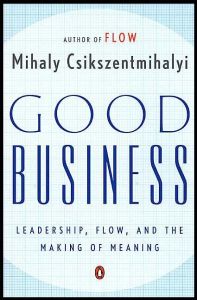Join getAbstract to access the summary!

Join getAbstract to access the summary!
Mihaly Csikszentmihalyi
Good Business
Leadership, Flow, and the Making of Meaning
Penguin, 2004
What's inside?
People achieve flow by being fully engaged in meaningful work. Look past profit, and go for the flow.
Recommendation
Take a look at the scandal-filled headlines, or just read a Dilbert comic strip about cubicle culture, and the message is clear: the business world is cutthroat, unethical and no fun. But here comes psychologist Mihaly Csikszentmihalyi with a contrarian message. Work should be fun, and companies should care about something aside from the bottom line. Using examples such as clothing maker Patagonia and investment pioneer Sir John Templeton, Csikszentmihalyi makes a convincing case that profits must come after meaning. Patagonia, for instance, lets workers take surf breaks, and Templeton became a model of full engagement. getAbstract suggests this book to any manager seeking a better way to do things, and to any employee hankering for deeper job satisfaction.
Summary
About the Author
Psychologist Mihaly Csikszentmihalyi was born in Hungary. He is a professor of psychology at the Peter F. Drucker School of Management at Claremont Graduate University in Claremont, California, where he is also the director of the non-profit Quality of Life Research Center. Csikszentmihalyi’s previous books include Flow: The Psychology of Optimal Experience and The Evolving Self: A Psychology for the Third Millennium.





















Comment on this summary